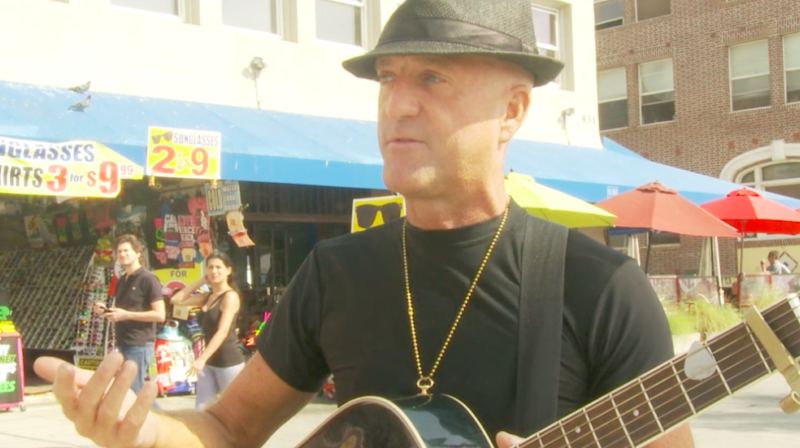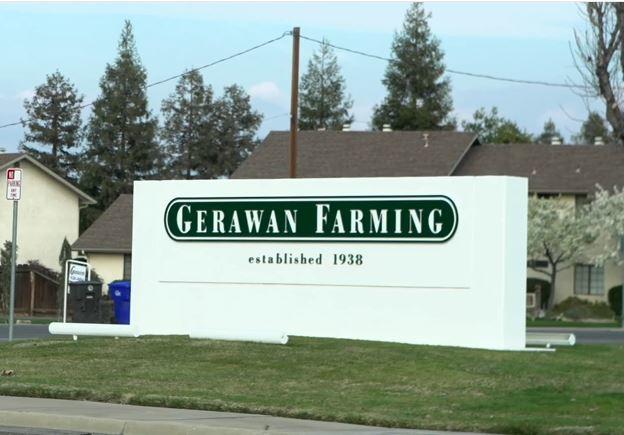

Click the right arrow button to go to the next slide.
[SlideDeck2 id=45066]
This is an encore posting from our State of Inequality series
Elizabeth Fladung is a Brooklyn-based, CalArts-trained photojournalist. Her work has appeared in The Nation, La Repubblica, The Fader and Wax Poetics Magazine.


The chord progression of the Red Hot Chili Peppers’ song “Otherside” plays on the south end of the Venice Beach boardwalk. The middle-aged man strumming his acoustic guitar is Gary St. Germain, who spends afternoons performing songs in Venice, Burbank and Hollywood, a black pork pie hat always perched on his head. When he has free time, St. Germain plays in Venice for two or three hours at a time.
This is an encore posting from our State of Inequality series
“I don’t have an amplifier,” St. Germain says. “So I set up where there isn’t too much music blasting and I just play what I love.”
Ironically, the more busy days at Venice seem to benefit him less. It’s the days when curious people stroll by that St. Germain makes 20 to 40 dollars after a few hours. According to St.
» Read more about: The Way We Live Now: Singing for Supper »


As comprehensive immigration reform stalls along party lines in Washington, D.C., state Democrats are taking action in Sacramento. Backed by an assortment of coalition partners, California’s blue lawmakers have authored 10 new immigration bills (four in the Senate and six in the Assembly) to better the lives of two million undocumented individuals — five percent of California’s population.
As a thunderstorm with hail and lightning soaked a drought-parched Sacramento, Senate President Pro Tem Kevin de León (D-Los Angeles) and Assembly Speaker Toni G. Atkins (D-San Diego) announced the “Immigrants Shape California” reform measures. They would increase the consumer, civil, criminal, health-care and labor rights of undocumented households.
“We are doing the work of the federal Congress,” said de León during a late-morning news conference inside the state Capitol. “This is our reaction to their lack of action.”
“With these bills,” said Atkins, “California will show the practical, humane and forward-thinking leadership that can move the needle on a national discussion.” To this end,
» Read more about: Curtain Raised on State Immigration Bills »
Somerset Waters has the passion of a convert. You can hear it in his voice when he outlines why he set up the only worker-owned cooperative business in Los Angeles.
“It’s really exciting pushing the boundaries of how a small business can operate here,” he says, standing in front of a bank of solar panels outside a residence in Calabasas. “People want a sense of ownership at work, a feeling of justice, a real stake in their working lives.”
Last year, inspired by the Pioneer Valley Solar Co-Op in Massachusetts, and with guidance from co-op resource center LA WORCS, Waters created Pacific Electric, a worker-owned co-op, to see if a different kind of business model could take hold in Los Angeles.
The four-person union firm, which has plans for expansion to 100 owner-members, installs solar and other electrical systems for residential and business customers throughout Los Angeles County.
» Read more about: Workers of the World – Buy Your Own Company! »


(Yesterday David Bacon examined a decades-long labor war being fought by Gerawan Farming against the United Farm Workers — a union against which the company has been accused of orchestrating a decertification campaign. His reporting concludes today with a look at Gerawan’s political allies and the company’s attempt to overturn a key California labor law.)
As this fight unfolds, national anti-union organizations are moving in. The far-right Center for Constitutional Jurisprudence joined the appeals case. In recent years the Center has joined the Harris v. Quinn suit against the Service Employees International Union in Illinois, sued the California Labor Commissioner on behalf of employers, argued for Hobby Lobby stores against providing birth control for their employees, and supported the initiative to end affirmative action in Michigan.
Furthermore, the Center for Worker Freedom, headquartered in the Washington, D.C. offices of Grover Norquist’s Americans for Tax Reform (ATR),
» Read more about: Conservative Groups Rally Behind Gerawan Farming »


Click the right arrow button to go to the next slide.

This is an encore posting from our State of Inequality series
(Andy Warner’s comics have appeared in many places, including Slate, Medium, American Public Media, Symbolia, KQED, popsci.com and for the United Nations Refugee and Works Agency.)


When hundreds of people marched to the Los Angeles City Council last October, urging it to pass a resolution supporting a farm worker union fight taking place in California’s San Joaquin Valley, few had ever heard the name of the company involved. That may not be the case much longer. Gerawan Farming, one of the country’s largest growers, with 5,000 people picking its grapes and peaches, is challenging the California law that makes farm workers’ union rights enforceable. Lining up behind Gerawan are national anti-union think tanks. What began as a local struggle by one grower family to avoid a union contract is getting bigger, and the stakes are getting much higher.
The Gerawan workers got the City Council’s support and, on February 10, the Los Angeles Unified School District Board of Education passed a resolution that went beyond just an encouraging statement.
» Read more about: Growers Move to Gut California’s Farm Labor Law »


Click on the right arrow button to go to the next slide.
Data and research for this story were provided by Charlie Eaton of U.C. Berkeley’s Department of Sociology and DebtandSociety.org.

This is an encore posting from our State of Inequality series.
» Read more about: Affluent Private Universities Are Tax Shelters For the Rich »


Sometimes the conventional narrative the media tell about a news story feels so wrong I can’t stand it — but I don’t know why until the story’s over. The recent coverage of the labor dispute at the West Coast ports — including Los Angeles and Long Beach — is a case in point. News reports focused on the long, drawn-out negotiation process as an economic disaster waiting to happen, and blamed the entire situation on those dastardly workers and their unions.
The narrative included several key arguments: A union slowdown at the ports was causing a backlog of shipping containers carrying everything America buys, putting all importers at risk and causing a plague on American shoppers. There would be long-term economic damage to our region as a consequence. With the eventual opening of the widened Panama Canal, shippers would skip the West Coast and head to other ports.


 Capital & Main has confirmed that a proposed California law could upend existing minimum wage laws across the state, potentially rolling back wage increases for tens of thousands of people. If passed, the legislation could invalidate wage hikes approved by voters in some of the state’s largest cities, including San Francisco and Oakland. (See original story here.)
Capital & Main has confirmed that a proposed California law could upend existing minimum wage laws across the state, potentially rolling back wage increases for tens of thousands of people. If passed, the legislation could invalidate wage hikes approved by voters in some of the state’s largest cities, including San Francisco and Oakland. (See original story here.)
Assembly Bill 669 is backed by the California Restaurant Association (CRA) and is being championed by Assemblyman Tom Daly, a Democrat from the Orange County city of Anaheim.
The legislation’s target is tipped workers – under Daly’s proposal, the minimum wage for workers who receive tips would be capped at $9 if their total hourly compensation, meaning base wage and tips, is $15 an hour or more. If, for example, an Oakland waitress earns that city’s current minimum wage of $12.25 an hour,